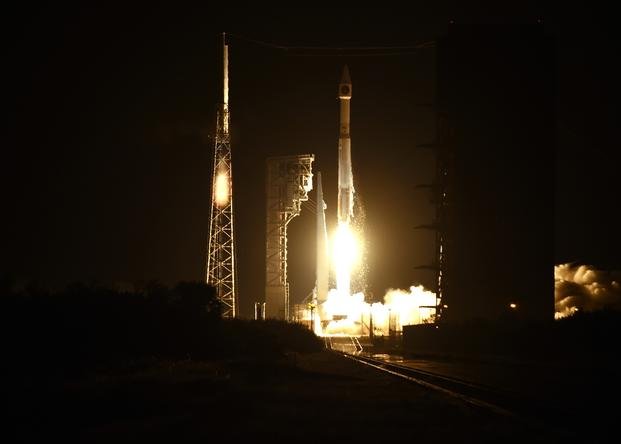The U.S. Air Force has awarded contracts to Blue Origin, Northrop Grumman Innovation Systems and United Launch Alliance to develop and test three launch system prototypes that could deliver future military space payloads.
The launch service agreements "will facilitate the development of three domestic launch system prototypes and enable the future competitive selection," the Air Force said in a statement.
The Defense Department has the option to narrow it to two companies no later than 2020 that will then compete for future launches.
Jeff Bezos' Blue Origin, awarded $500 million for the preliminary work, will build its New Glenn Launch System. Northrop Grumman Innovation Systems, formerly Orbital ATK Inc., was awarded $792 million and will manufacture its OmegA Launch System. And United Launch Alliance -- a joint venture between Lockheed Martin and Boeing -- received a $967 million award for development of its Vulcan Centaur Launch System.
Related content:
- Is SpaceX or Northrop to Blame for Lost Spy Satellite?
- Air Force Seeks Next-Gen Launch Vehicles for Space Missions
- Russia and China Racing to Get Satellite Jammers, Report Finds
"Our launch program is a great example of how we are fielding tomorrow's Air Force faster and smarter," said Air Force Secretary Heather Wilson in a statement. "We're making the most of the authorities Congress gave us, and we will no longer be reliant on the Russian-built RD-180 rocket engine."
The Air Force last year released a request for proposal for its next iteration of the Evolved Expendable Launch Vehicle, known as EELV, to be used on space lift such as the Atlas V, Delta IV and Falcon 9 rocket systems. The service's goal is to move away from use of Russian-made RD-180 engines.
Following Russia's annexation of Crimea in 2014, Congress mandated through the fiscal 2015 National Defense Authorization Act -- as well as succeeding NDAAs -- that the EELV program function as the transition from RD-180 engines to American-made launch solutions.
United Launch Alliance in 2015 announced it plans to retire the Delta IV variant. Officials said its replacement should be ready by the 2023 timeframe.
Since 2003, the EELV program has launched 72 national security missions using the Atlas V and Delta IV launch vehicles.
The latest contracts are Other Transaction agreements, known as OTs. The "nontraditional acquisition arrangements" are typical for prototyping and "allow for shared investment," the Air Force said.
The service will award other commercial launch services contracts to providers "who demonstrate the capability to design, produce, qualify, and deliver launch systems and provide the mission assurance support required to deliver National Security Space satellites to orbit," the release said.
For example, SpaceX's Falcon Heavy rockets were given the green light to carry the Air Force's national security satellites in June. The company, headed by billionaire business magnate Elon Musk, was awarded a $130 million firm-fixed price contract for EELV services to deliver Air Force Space Command's 52 satellite, known as AFSC-52, into orbit, the Air Force said at the time.
The award -- which marks the first military national security space payload on the Falcon Heavy craft -- is for a single launch.
-- Oriana Pawlyk can be reached at oriana.pawlyk@military.com. Follow her on Twitter at @Oriana0214.










